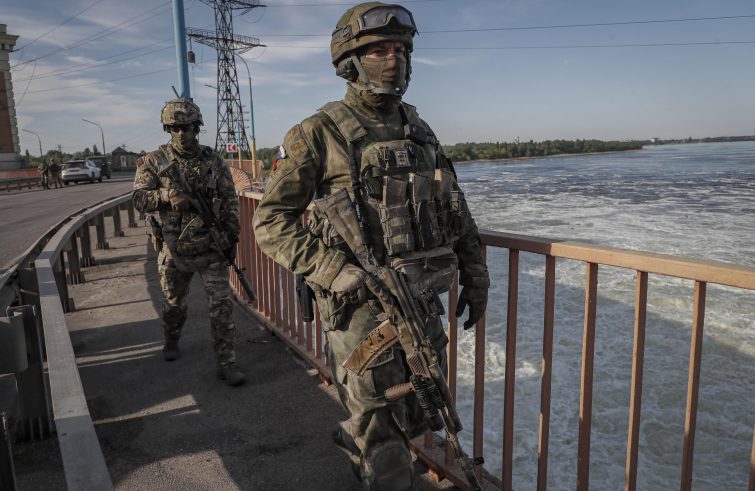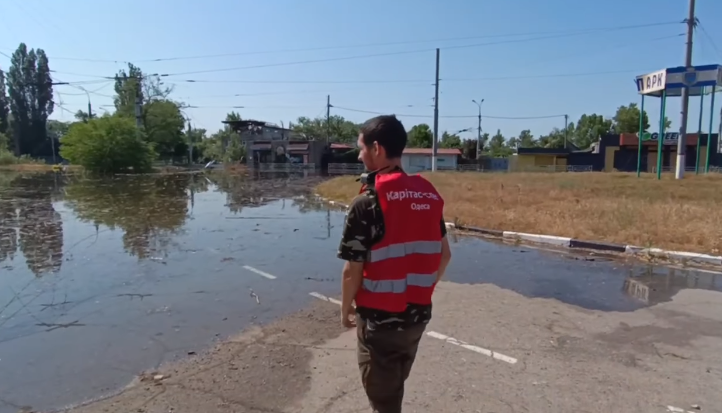
“We are facing a very serious and very dangerous situation since the exact number of people directly affected by this horrific act of terrorism is unknown at the moment. What we know is that an influx of displaced persons is pouring into several areas of Ukraine, especially in Odessa and Mykolaiv as well as in the central part of the country, looking for a safe place to go. On top of this, those who remained are facing a serious drinking water emergency.” Father Vyacheslav Grynevych, Secretary General of Caritas-Spes was contacted by SIR in Kyiv where he has been closely monitoring the situation in the southern region of Ukraine since yesterday, when the Nova Kakhovka dam was blown up unleashing a flood of water on both banks of the Dnipro River – the highest wave of water is expected today. Caritas Spes is taking stock of the situation with an ’emergency meeting’ with all of its workers twice a day, during which the situation is assessed, emergency cases are identified and attempts are made to implement relief efforts, he explained. “We have grown accustomed to reorganising our projects and activities depending on the emergencies, unfortunately,” the priest explained. “We are currently analysing the situation. We’re still in the throes of an emergency.”
“The explosion left residents with no electricity and a shutdown of infrastructures, the water system has stopped working. We are now facing a serious shortage of clean drinking water,” said Father Grynevych. Our Caritas centres have already sent two truckloads of drinking water to the region and two more are on their way. However, we are still in the process of assessing further needs. Food will certainly be needed. But right now, the lack of drinking water is the greatest emergency. We have been informed that many people have been evacuating from the hardest-hit villages, although at the moment it’s difficult to know where they are heading. We do know that most evacuees are Khershon residents who reached Odessa and Mykolaiv. But we also have news of people fleeing, headed to the central regions of Ukraine.” Finally, the presence of an animal cemetery near Kherson is a cause for concern. “If water from the Dnipro River reached this cemetery, bacteria could cause a spread of infectious diseases,” said the Caritas-Spes spokesperson.

A Caritas-Spes Odessa team is currently at the scene, helping Kherson region residents evacuate and reach the railway station and the hospital, both of which now serve as collection points. Reports from the Ministry of Home Affairs stated that as of 4pm yesterday, 1,339 people had been evacuated from Kherson. Some 80 villages are at risk of flooding, Caritas reported. Evacuees are travelling via railway networks to Mykolaiv and Odessa, where Caritas activities are centred. A preliminary report published on the Bishops’ Conference website recorded water supply shortages in Kryvyi Rih, Marhanka and Nikopol. Electricity and gas supplies were cut off in several villages also left with no access to drinking water. Some 16,000 people face a critical situation on the right bank of the Dnipro River in the Kherson region alone. Caritas workers are likewise concerned about the situation in Crimea, which could be left without a clean water supply. Uncontrolled lowering of the water level poses a further threat to the Zaporizhzhya nuclear power plant, located on the southern shore of the Kakhovka Reservoir and occupied by Russian troops for the past year and a half. A lack of cooling water supply could potentially risk a nuclear accident. For the time being, however, Energoatom has declared that the situation is under control.









